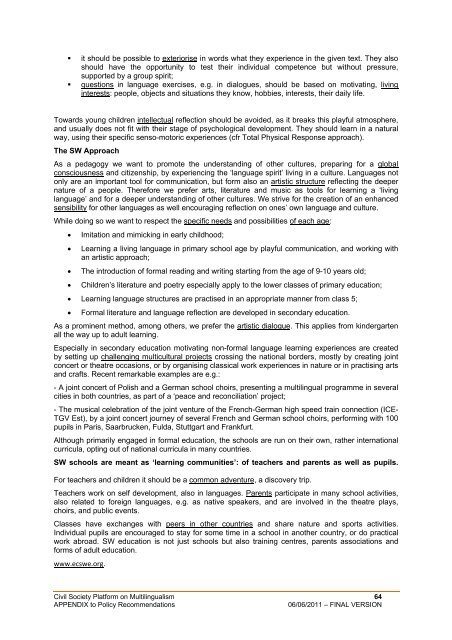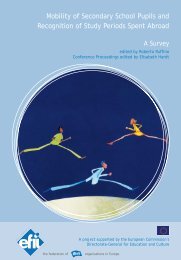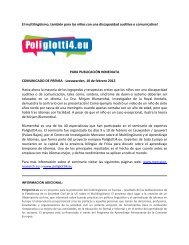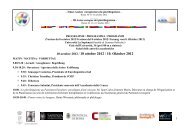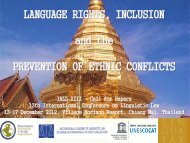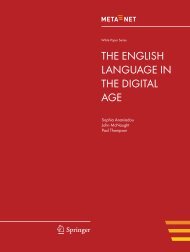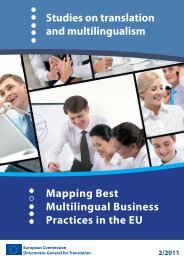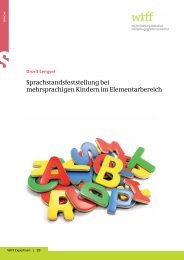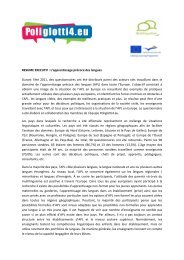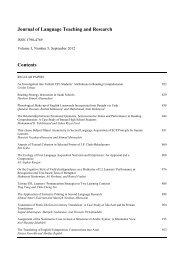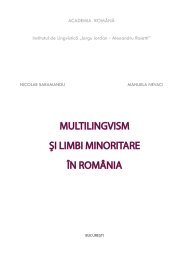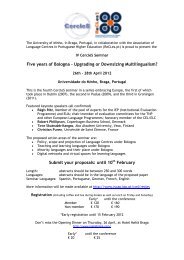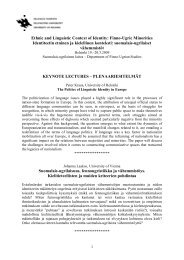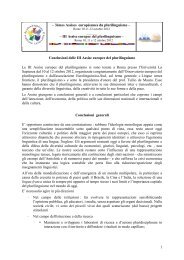FULL VERSION - European Commission - Europa
FULL VERSION - European Commission - Europa
FULL VERSION - European Commission - Europa
You also want an ePaper? Increase the reach of your titles
YUMPU automatically turns print PDFs into web optimized ePapers that Google loves.
• it should be possible to exteriorise in words what they experience in the given text. They alsoshould have the opportunity to test their individual competence but without pressure,supported by a group spirit;• questions in language exercises, e.g. in dialogues, should be based on motivating, livinginterests: people, objects and situations they know, hobbies, interests, their daily life.Towards young children intellectual reflection should be avoided, as it breaks this playful atmosphere,and usually does not fit with their stage of psychological development. They should learn in a naturalway, using their specific senso-motoric experiences (cfr Total Physical Response approach).The SW ApproachAs a pedagogy we want to promote the understanding of other cultures, preparing for a globalconsciousness and citizenship, by experiencing the ‘language spirit’ living in a culture. Languages notonly are an important tool for communication, but form also an artistic structure reflecting the deepernature of a people. Therefore we prefer arts, literature and music as tools for learning a ‘livinglanguage’ and for a deeper understanding of other cultures. We strive for the creation of an enhancedsensibility for other languages as well encouraging reflection on ones’ own language and culture.While doing so we want to respect the specific needs and possibilities of each age:Imitation and mimicking in early childhood;Learning a living language in primary school age by playful communication, and working withan artistic approach;The introduction of formal reading and writing starting from the age of 9-10 years old;Children’s literature and poetry especially apply to the lower classes of primary education; Learning language structures are practised in an appropriate manner from class 5; Formal literature and language reflection are developed in secondary education.As a prominent method, among others, we prefer the artistic dialogue. This applies from kindergartenall the way up to adult learning.Especially in secondary education motivating non-formal language learning experiences are createdby setting up challenging multicultural projects crossing the national borders, mostly by creating jointconcert or theatre occasions, or by organising classical work experiences in nature or in practising artsand crafts. Recent remarkable examples are e.g.:- A joint concert of Polish and a German school choirs, presenting a multilingual programme in severalcities in both countries, as part of a ‘peace and reconciliation’ project;- The musical celebration of the joint venture of the French-German high speed train connection (ICE-TGV Est), by a joint concert journey of several French and German school choirs, performing with 100pupils in Paris, Saarbrucken, Fulda, Stuttgart and Frankfurt.Although primarily engaged in formal education, the schools are run on their own, rather internationalcurricula, opting out of national curricula in many countries.SW schools are meant as ‘learning communities’: of teachers and parents as well as pupils.For teachers and children it should be a common adventure, a discovery trip.Teachers work on self development, also in languages. Parents participate in many school activities,also related to foreign languages, e.g. as native speakers, and are involved in the theatre plays,choirs, and public events.Classes have exchanges with peers in other countries and share nature and sports activities.Individual pupils are encouraged to stay for some time in a school in another country, or do practicalwork abroad. SW education is not just schools but also training centres, parents associations andforms of adult education.www.ecswe.org.Civil Society Platform on Multilingualism 64APPENDIX to Policy Recommendations06/06/2011 – FINAL <strong>VERSION</strong>


